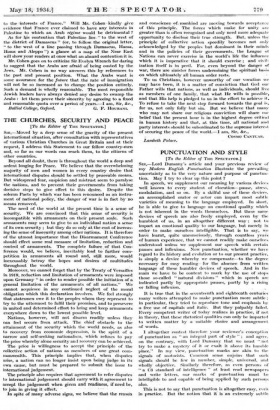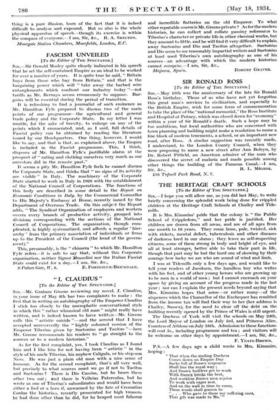PUNCTUATION AND- STYLE
[To the Editor of THE SPECTATOR.] SIR,—Lord Dunsany's article and your previous review of my Modern English Punctuation illustrate the prevailing uncertainty as to the very nature and purpose of punctua- tion. May I try to clear up this point ?
In speech, we supplement our meaning by various devices well kndwn to every student of elocution—pause, strew:, modulation, . and so on. By a skilful use of these deVices, an accomplished orator or actor can impart most subtle varieties of meaning to the language employed. In short, he is able to give to language an emotional quality which is not inherent in the words themselves. But these same devices of speech are also freely employed, even by the humblest of us, in an altogether different way : not to. impart an emotional quality to our language, but merely in. order to make ourselves intelligible. That is to say, we have learnt, quite unconsciously, through countless years of human experience, that we cannot readily make ourselves understood unless we supplement our speech with certain pauses and inflexions. Now punctuation, whether we have regard to its history and evolution or to our present practice, is simply a device whereby we compensate—to the degree necessary for easy reading—for the absence from written language of these humbler devices of speech. And in the main we have to be content to mark by the use of stops those so-called " natural divisions " which in speech are indicated partly by appropriate pauses, partly by a rising or falling inflexion.
It is true that in the seventeenth and eighteenth centuries many writers attempted to make punctuation more subtle ; in particular, they tried to reproduce tone and emphasis by a free use of capitals and italic. But they palpably failed. Every competent writer of today realizes in practice, if not in theory, that these rhetorical qualities can only be imparted to written matter by a suitable choice and arrangement of words.
I altogether contest therefore your reviewer's conception of punctuation as " an integral part of style " ; and agree. on the contrary, with Lord Dunsany that we must " not try to make a mystery of it or exalt it above its humble place." In my view, punctuation marks are akin to the signals of motorists. Common sense enjoins that such signals should be few in number, simple, universal, and wholly objective. Similarly therefore, as even persons of " a C3 standard of intelligence " at least read newspapers and write letters, our marks of punctuation must be intelligible to and capable of being applied by such perions also. - This is not to say that punctuation is altogether easy, even in practice. But the notion thit it is an extremely subtle
thing is a pure illusion, born of the fact that it is indeed difficult to analyse and expound. But so also is the whole physical apparatus of speech—though its exercise is within the compass of everyone.—I am, Sir, &e., R. A. SKELTON.
Moorgate Station Chambers, Moorfields, London, E.C.









































 Previous page
Previous page